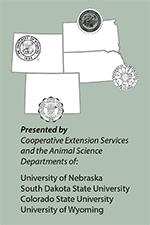Adapting Is Essential
to Survive and Thrive
Research shows innovators and early adopters tend to stay in business.
CHEYENNE, Wyo. (Nov. 28, 2017) — “Our environment is constantly changing. Those that adapt and change to the new environment fit and thrive. Those that don’t are misfits,” and often go out of business, shared Zoetis technical veterinarian Robin Falkner as he addressed beef producers and beef industry leaders gathered in Cheyenne, Wyo., Nov. 27 for a dinner and presentation hosted by Certified Angus Beef LLC (CAB) and Zoetis. The event was a precursor to the biennial Range Beef Cow Symposium (RBCS) hosted Nov. 28-30 in Cheyenne.
Falkner, who works from Tennessee, continued his comments about adapting, noting, “If there are things (i.e., technology) that can give you a little advantage, you need to take it.”
He offered historical examples in agriculture where individuals were slow to adapt to new equipment or new techniques and eventually went out of business. Specifically, Falkner cited a study from the 1950s and 1960s looking at adoption of new seedcorn hybrids. Among the farmers studied, 2.5% were innovators, 13.5% were early adopters — and those are the individuals who stayed in business, Falkner noted.
Via that groundbreaking study, the adoption rate identified was the basis for the Roger’s bell curve of adoption that is still used across industries today. Falkner encouraged those in the audience to move toward being innovators and early adopters.
Among the “disruptive technologies” Falkner encouraged ag operations to consider using were genetic testing, advanced reproduction technologies, risk management strategies related to both the market and disease management, recreational land use opportunities, and strategies to maintain and expand market access. He noted that recent vaccine innovations — such as products that allow true fetal protection and a prime boost to the immune system via intranasal administration — are offering new opportunities in cattle health and performance.
Additionally, Falkner encouraged producers to think differently about their operations. He shared the statistic that 65% of beef calves are born in three months of the year, then posed the question: “Does this bother you?”
Regarding the traditions and culture in agriculture, Falkner expressed: “Agriculture is a noble profession. … It offers inherent value that is more than just producing food.”
That said, he also cautioned against getting tied to tradition for tradition’s sake. He asked the audience to consider: “If I’m doing what my granddaddy did, am I actually doing what granddaddy did?”
He then pointed out: “If granddaddy was the first to use new things — like barbed wire or a baler or AI (artificial insemination) — because that made him better, he adopted the new technology. So are you continuing to do what granddaddy did? Are you being one of the first to adopt new technology to get better?”
In closing, Falkner cited a recent Wall Street Journal article that suggested: “Technology is neither good nor bad. Nor is it neutral.” To this, he stated, “Technology can’t be ignored.”
Editor’s Note: This summary was written under contract or by staff of the Angus Journal®, which retains the copyright. To request to reprint this article, contact Shauna Rose Hermel, editor, at 816-383-5270. PowerPoints are posted with permission of the presenter and may not be reproduced in whole or in part without the express permission of the presenter. Angus Journal claims copyright to this website as presented. We welcome educational venues and cattlemen to link to this site as a service to their audience.
The Angus Journal's coverage of the event is made possible in collaboration with the event committee. For questions about this site, or to notify us of broken links, click here. Look for additional coverage in the Angus Journal, the Angus Beef Bulletin, the Angus Journal Daily, the Angus Beef Bulletin EXTRA and The Angus Report.


